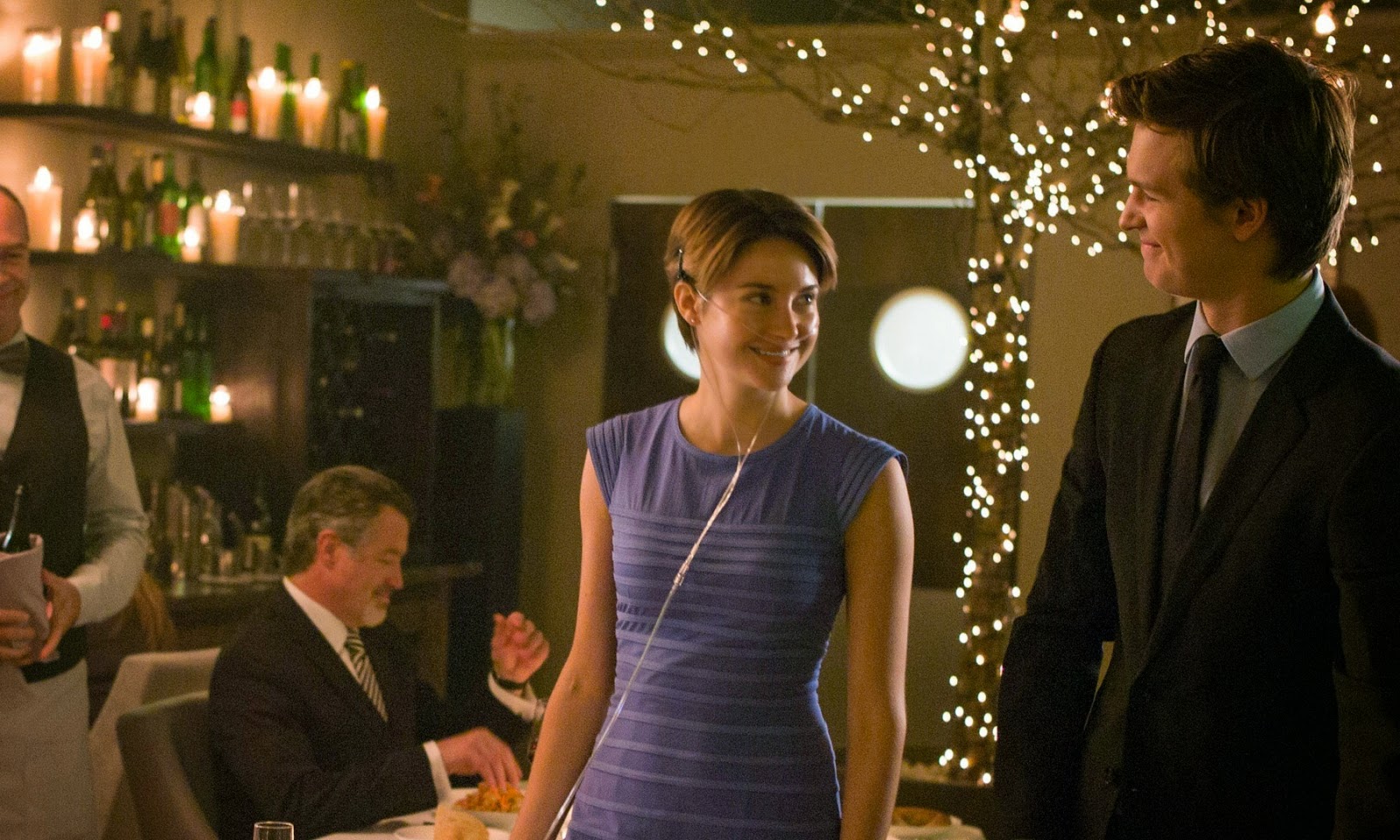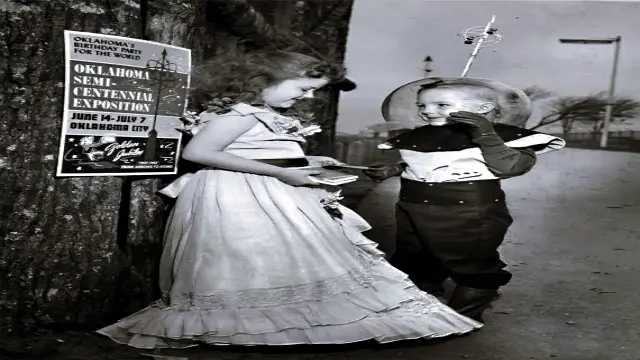
Films that start out with voiceovers telling you how this movie’s not going to be like other movies automatically place themselves on probation, headed almost inevitably for remand. This astoundingly overrated piece of pablum commences by congratulating its target audience on being too cool to fall for the clichés it then sets about foisting assiduously. Shailene Woodley’s charm is the crutch director Josh Boone leans on, rocking the cutest set of nostril oxygen inlets you ever did see, hair in a waif cut that would make Audrey Hepburn jealous, playing a teenage girl who exists precariously on the edge of mortality with cancer in her lungs whilst never looking less healthy than the average Olympic pole vaulter. She plays Hazel Grace Lancaster, who clings to life thanks to a variably effective experimental drug, and is pushed by her parents (Laura Dern and Sam Trammell) to attend a dippy support group run by amusingly earnest, guitar-strumming Jesus freak Patrick (Mike Birbiglia). This dubious experience proves worthwhile when she encounters the most totally hot guy with one leg you could ever hope to meet, Augustus ‘Gus’ Waters (Ansel Elgort, which must be an anagram of some kind*), a big block of bland who talks in the same post-Joss Whedon-Veronica Mars rhythms as her, with an added layer of sunny overconfidence; and yet the verbal articulateness and writer’s-room arsenal of quips the duo have been given are in no way substitutes for actual character. Gus has survived a bout with the Big C himself at the expense of having one leg amputated, and has a positive outlook which he insists on expressing in most excruciating ways. He initially appals Hazel by sticking a cigarette in his mouth but then explains that he does not light them because he does not give it the power to kill him. She finds this crap charming, and soon Hazel and Gus are head over heels, only for Hazel to ward him off for fear of his heartbreak when he loses her.

Hazel is obsessed with a novel called “An Imperial Affliction,” by expatriate American writer Peter Van Houten, about a girl also dying of cancer, with an infamously curtailed ending, and Hazel transmits her enthusiasm to Gus, as well as curiosity over the unanswered questions left by the novel. A trip to Amsterdam financed by a Make-a-Wish Foundation stand-in allows the young couple to find out first hand and of course provide a catalysing setting for a snog-fest. This movie was itself based on a very popular and well-regarded YA novel by John Green, which I haven’t read, though many tell me the specific, wonky rhythm of the source material is missing. The audience around me, doubtlessly familiar with the book, reacted to specific moments with fetishistic intensity is if holy writ was being portrayed. Undoubtedly the film’s pot-shots at predecessors take aim at Love Story (1970) amongst many, but what’s interesting about the difference between even Erich Segal’s drippy tale and this one is the way the social context important to Segal’s story has been removed: everyone here is from a nice leafy suburb with no health care problems. If it can’t reach such low-hanging fruit, this film certainly can’t approach classic sob-fests like Camille (1936) or Dark Victory (1939) for offering intimate humanity pushed to operatic extremes of suffering. The main difference between The Fault in Our Stars and such weepie melodramas about doomed lovers registers in the stream of gallows humour the couple offer, and the self-aware, ahead-of-the-game perspective Hazel’s voice-over is supposed to imbue upon the material and our response to it with a distanced appreciation of the experience. “This is the truth,” she tell us at the outset, and notes later encounters with crucial, clichéd pivots of cancer dramas, like the “last good day.” But the film’s attacks on cliché are of course only skin-deep, masking a cheaply sentimental series of laboured sequences designed to induce sympathy pains, including interludes in sparkly Dutch restaurants and, most tediously, Gus listening to his own eulogies, which gives the filmmakers eminent opportunity to swat the audience between the eyes with pathos.

Grace and Gus are equipped with a funny friend, Isaac (Nat Wolff), who’s lost one eye to a tumour and is about to lose another; his pain and anguish, especially over losing his girlfriend Monica (Emily Peachey), is played for comic relief from the main business of ogling precisely the sort of pretty people suffering preciously to cool music which we’ve been promised we won’t get. The first moment when Isaac wakes up blind, now there’s a terrible moment that should be confronted in a film that is telling “the truth.” But no, Isaac is nudged out of the story and then brought back when his blindness can be used as the stuff of cheap gags and false catharsis, as he and the lovers go to toss eggs at Monica’s sports car. Willem Dafoe’s cameo as the bilious, alcoholic Van Houten does momentarily offer the characters – and the film – the shock of dark emotion. As things turn out, the seemingly amicable invitation to visit furnished by the author actually came from his long-suffering secretary Lidewij (Lotte Verbeek), who hoped to stir the author’s heart, but the encounter only ends with fury and humiliation. This subplot is played simply to offer a bit of blunt, schlocky disillusionment and set up an entirely silly late twist, where it might have been used to complicate the story’s approach to its meta conceits and to explore the impact of loss on loved-ones through loss – Van Houten’s daughter was the inspiration for the tale – as opposed to Hazel’s cosily cool parents. But real pain is quelled in favour of mawkish conceits, and emotional intensity is squandered. The meeting with Van Houten precipitates the young couple surrendering at last to passion in the Anne Frank Museum, a notion that might have been played as proof of the ferocity of human desire and life-hunger in the face of extinction, and indeed that’s what it’s supposed to communicate, but instead arrives limp and more than a tad tasteless. So too does the narrative twist wherein suddenly it’s revealed that Gus and not Hazel is going to be first of the duo to die.

The inevitable moment when Van Houten turns up at the end on a make-amends excursion tries to play against the grain by leaving Van Houten unredeemed except as proof reader. But his part in the story goes well beyond a glib deflowering of Hazel’s optimism, played as a hatefully extreme figure who opposes the teens’ vague spirituality with caricatured pragmatism (“You are nothing more than a failed experiment in mutation!”). This film fascinatingly posited to me the possibility that it is less a study of the tragedy of doomed youth than a work using disease to justify its millennial-aged target audience’s resentment of any world view that doesn’t confirm them as the centre of the universe. The Fault in Our Stars is at its best when the dark humour shared by the young sufferers used to living with dread is pushed to the fore, like their wry rejection of the kind of shallow uplift proffered by Patrick with his weak grasp of English particulars, mostly thanks to the well-oiled repartee between Woodley and Elgort. But Elgort fumbles early on with making his character seem much more than whatever the male equivalent of the Manic Pixie Dream Girl is (a field for further research?), and can’t make his later fear and resentment voluble. Woodley’s capacity to deliver less pleasant emotions is well utilised in a couple of scenes, particularly when she confronts her parents over their seeming incapacity to truly accept her inevitable end. But the film remains disgustingly squeaky clean even when offering a peek of Gus’s curtailed leg when in bed – safely post-coital – with Grace. This is romantic tragedy as iPhone app. For actual, heartfelt subversion of the genre, check out Valérie Donzelli’s Declaration of War (2011), or better yet, Paul Verhoeven’s genuinely raw and uniquely romantic Turkish Delight (1974).
* my fellow cineaste Michael W. Phillips Jr proposes “eternal slog.”






















